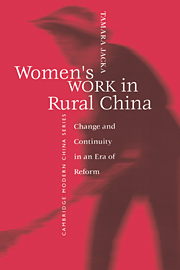Book contents
- Frontmatter
- Contents
- List of Tables
- Acknowledgements
- Abbreviations
- Introduction
- 1 Theorising gender
- 2 Patterns from the past
- 3 Post-Mao reforms
- 4 Families
- 5 Education and politics
- 6 Domestic work
- 7 Agriculture
- 8 Entrepreneurs on the farm
- 9 Industry
- 10 Conclusion
- Appendix 1 Summary of information on sample families in rural Beijing, Shandong and Sichuan
- Appendix 2 Employment in sample township enterprises in rural Beijing, Shandong and Sichuan
- Notes
- Bibliography
- Index
10 - Conclusion
Published online by Cambridge University Press: 20 March 2010
- Frontmatter
- Contents
- List of Tables
- Acknowledgements
- Abbreviations
- Introduction
- 1 Theorising gender
- 2 Patterns from the past
- 3 Post-Mao reforms
- 4 Families
- 5 Education and politics
- 6 Domestic work
- 7 Agriculture
- 8 Entrepreneurs on the farm
- 9 Industry
- 10 Conclusion
- Appendix 1 Summary of information on sample families in rural Beijing, Shandong and Sichuan
- Appendix 2 Employment in sample township enterprises in rural Beijing, Shandong and Sichuan
- Notes
- Bibliography
- Index
Summary
REFORMS undertaken in rural China since 1978, in particular, decollectivisation, diversification of the rural economy and strict family planning, have resulted in both change and continuity in the types of work undertaken by women and men, in gender divisions of labour and in the values associated with those divisions.
In some cases women have been able to take advantage of new work opportunities to enhance their position in society in terms of relations with others and access to, and control of, resources. On the whole, however, women have not benefited from the reforms to the same extent as men, and the reforms have not led to an improvement in rural women's position, either within the family or in the wider community. Rather, certain aspects of women's subordination have intensified and others have been altered or broken down, only to form new patterns of subordination.
In this book I have argued that central to this process has been a reinforcement and a redefinition of conceptual dichotomies between outside/inside, heavy/light and skilled/unskilled work. In each dichotomy the former term is associated with men, the latter with women. These dichotomies can be thought of as sets of values and assumptions relating to work and to gender identity. They shape the work opportunities and choices of women and men and the ways in which different types of work are perceived, and they contribute to the construction and maintenance of gender identities.
- Type
- Chapter
- Information
- Women's Work in Rural ChinaChange and Continuity in an Era of Reform, pp. 190 - 196Publisher: Cambridge University PressPrint publication year: 1997

